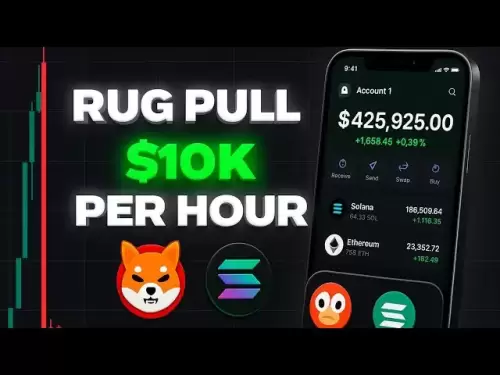-
 Bitcoin
Bitcoin $117700
-0.03% -
 Ethereum
Ethereum $3805
0.49% -
 XRP
XRP $3.098
-1.00% -
 Tether USDt
Tether USDt $1.000
0.03% -
 BNB
BNB $792.8
-1.72% -
 Solana
Solana $177.9
-1.95% -
 USDC
USDC $1.000
0.02% -
 Dogecoin
Dogecoin $0.2202
-1.55% -
 TRON
TRON $0.3278
-2.92% -
 Cardano
Cardano $0.7641
-2.43% -
 Hyperliquid
Hyperliquid $42.21
-2.68% -
 Sui
Sui $3.758
-1.58% -
 Stellar
Stellar $0.4080
-3.21% -
 Chainlink
Chainlink $17.75
-0.33% -
 Bitcoin Cash
Bitcoin Cash $591.8
4.96% -
 Hedera
Hedera $0.2561
-3.09% -
 Avalanche
Avalanche $23.34
-4.24% -
 Litecoin
Litecoin $110.7
1.96% -
 UNUS SED LEO
UNUS SED LEO $8.956
-0.01% -
 Toncoin
Toncoin $3.410
0.79% -
 Ethena USDe
Ethena USDe $1.001
0.03% -
 Shiba Inu
Shiba Inu $0.00001288
-1.82% -
 Uniswap
Uniswap $10.07
-2.06% -
 Polkadot
Polkadot $3.807
-2.27% -
 Monero
Monero $308.2
-2.15% -
 Dai
Dai $1.000
0.03% -
 Bitget Token
Bitget Token $4.521
-0.30% -
 Pepe
Pepe $0.00001134
-1.52% -
 Cronos
Cronos $0.1457
0.65% -
 Aave
Aave $274.9
-2.47%
How to buy Bitcoin ETFs? Detailed steps and platform recommendation guide
Bitcoin ETFs offer investors exposure to Bitcoin's price without direct ownership, providing a regulated and accessible way to trade BTC through traditional brokerage accounts.
Jun 13, 2025 at 03:28 am
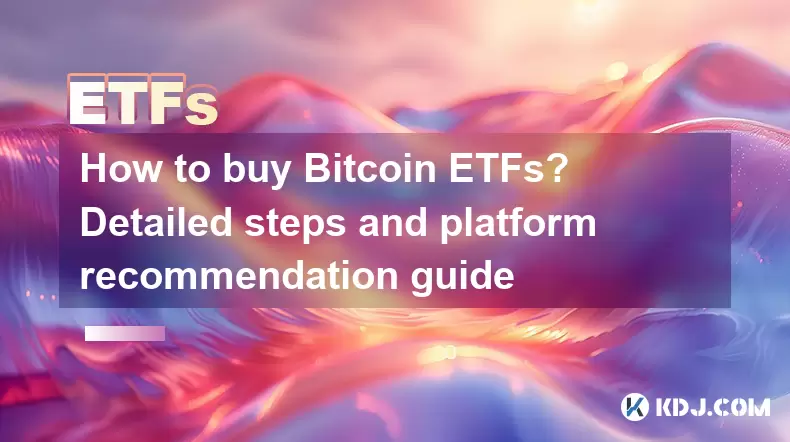
Understanding Bitcoin ETFs and Their Role in Investment
Bitcoin Exchange-Traded Funds (ETFs) are financial instruments that track the price of Bitcoin (BTC) without requiring investors to directly own the cryptocurrency. These ETFs trade on traditional stock exchanges, making them accessible through brokerage accounts. Unlike direct crypto ownership, Bitcoin ETFs provide exposure to BTC’s price movements while eliminating the need for private key management or dealing with crypto wallets.
Investors who are familiar with stock trading but new to cryptocurrencies often prefer Bitcoin ETFs due to their regulated nature and integration into existing investment platforms. They also offer liquidity, diversification options, and risk mitigation compared to holding actual digital assets.
Key Considerations Before Buying a Bitcoin ETF
Before proceeding to purchase Bitcoin ETFs, it is essential to evaluate several factors:
- Regulatory Approval: Confirm whether the ETF has been approved by regulatory bodies such as the Securities and Exchange Commission (SEC) in the United States.
- Underlying Assets: Understand whether the ETF is backed by physical Bitcoin or uses futures contracts.
- Expense Ratio: Compare the fees charged by different ETF providers, as they can impact long-term returns.
- Trading Volume: Higher volume typically indicates better liquidity and narrower bid-ask spreads.
- Broker Compatibility: Ensure your brokerage supports trading of ETFs and provides access to the specific fund you're interested in.
These considerations help investors make informed decisions and avoid unnecessary risks when entering the Bitcoin ETF market.
Selecting a Brokerage Platform That Supports ETF Trading
To buy Bitcoin ETFs, you must use a brokerage platform that offers access to exchange-traded funds. Some popular brokers include:
- Interactive Brokers
- Fidelity Investments
- Charles Schwab
- TD Ameritrade
- ETRADE*
Each of these platforms enables users to search for ETFs by ticker symbol or keyword. When choosing a broker, consider aspects such as commission fees, user interface, research tools, and customer support. Additionally, ensure the platform allows real-time market data and provides order execution flexibility.
For international investors, regional brokers may offer access to local or global Bitcoin ETF products. Always verify if the broker supports trading on major exchanges like NYSE Arca or Nasdaq, where most Bitcoin ETFs are listed.
Searching and Identifying Available Bitcoin ETFs
Once your brokerage account is set up and funded, the next step involves identifying available Bitcoin ETFs. You can do this by:
- Using the search function within your brokerage platform
- Entering keywords such as “Bitcoin ETF” or “BTC ETF”
- Filtering results by asset class or provider
Some currently available Bitcoin ETFs include:
- ProShares Bitcoin Strategy ETF (BITO)
- ARK 21Shares Bitcoin ETF (ARKB)
- BlackRock iShares Bitcoin Trust (IBIT)
- Fidelity Wise Origin Bitcoin Fund (FBTC)
Each ETF may have different structures and underlying assets. For example, BITO primarily invests in Bitcoin futures contracts, while IBIT holds physical Bitcoin. Understanding these distinctions helps align investments with personal risk tolerance and strategy.
Purchasing Bitcoin ETFs: Step-by-Step Process
After selecting a suitable Bitcoin ETF, follow these steps to complete the transaction:
- Log in to your brokerage account
- Navigate to the trade section
- Enter the ticker symbol of the chosen ETF
- Select the type of order (market, limit, stop-limit)
- Specify the number of shares you wish to buy
- Review the transaction details carefully
- Confirm and submit the order
It's important to monitor your order status and ensure successful execution. Once purchased, the Bitcoin ETF shares will appear in your portfolio, reflecting real-time value based on Bitcoin’s current price movement.
For novice investors, placing a limit order rather than a market order can help control costs and prevent unexpected slippage during volatile market conditions.
Frequently Asked Questions About Bitcoin ETFs
What is the difference between a Bitcoin ETF and owning actual Bitcoin?
A Bitcoin ETF tracks the price of Bitcoin without granting direct ownership of the digital asset. Investors benefit from price exposure without managing wallets or private keys. In contrast, owning actual Bitcoin requires secure storage solutions and technical knowledge.
Are Bitcoin ETFs safe?
Bitcoin ETFs are generally considered safer than direct crypto holdings because they operate within regulated markets. However, they still carry market risk due to Bitcoin’s volatility. It's crucial to understand the ETF structure and its compliance with regulatory standards.
Can I store Bitcoin ETFs in a retirement account?
Yes, many brokerage platforms allow investors to hold Bitcoin ETFs within IRAs (Individual Retirement Accounts) or 401(k)s, depending on the custodian's policies. This enables tax-advantaged growth potential.
Do Bitcoin ETFs pay dividends?
Most Bitcoin ETFs do not pay dividends since they track an asset (Bitcoin) that does not generate income. However, some ETFs might reinvest any income derived from futures contracts or other derivative instruments used in their structure.
Disclaimer:info@kdj.com
The information provided is not trading advice. kdj.com does not assume any responsibility for any investments made based on the information provided in this article. Cryptocurrencies are highly volatile and it is highly recommended that you invest with caution after thorough research!
If you believe that the content used on this website infringes your copyright, please contact us immediately (info@kdj.com) and we will delete it promptly.
- Cold Wallet vs. MetaMask: A Crypto Wallet Revolution?
- 2025-07-31 10:30:57
- Bitcoin Casinos in 2025: Instant Payouts and Welcome Bonuses
- 2025-07-31 10:50:33
- Meme Coins in 2025: Token Burns and the Quest for Moonshots
- 2025-07-31 10:50:33
- Unlocking Value: A Deep Dive into Random Year 1 oz Krugerrand Gold Coins
- 2025-07-31 10:57:21
- LYNO Token Presale: AI Arbitrage Revolution in DeFi
- 2025-07-31 05:11:11
- Pepecoin Successors: Can These Cryptocurrencies Make You a Millionaire?
- 2025-07-31 05:50:12
Related knowledge
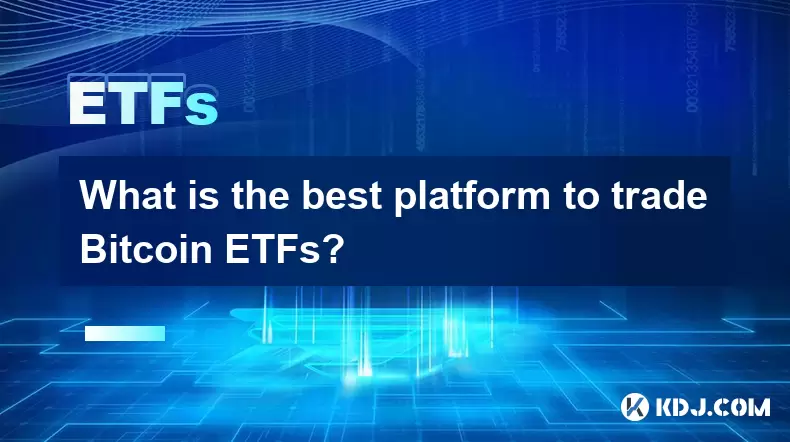
What is the best platform to trade Bitcoin ETFs?
Jul 23,2025 at 04:14am
Understanding Bitcoin ETFs and Their Role in TradingBitcoin Exchange-Traded Funds (ETFs) have gained significant traction among traditional and crypto...
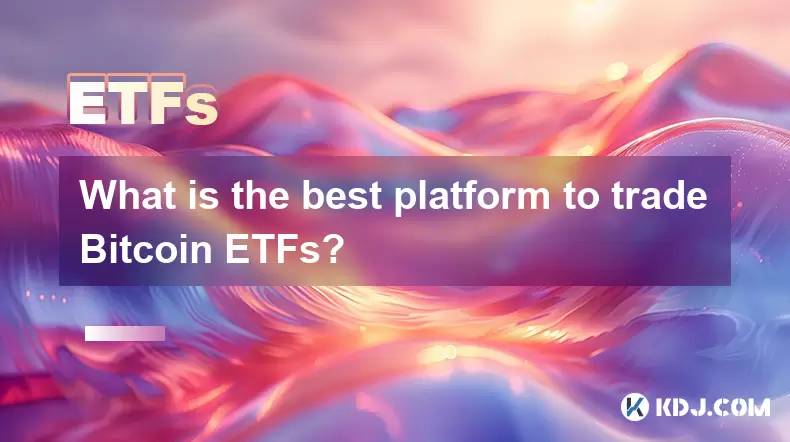
What is the best platform to trade Bitcoin ETFs?
Jul 17,2025 at 03:50pm
Understanding Bitcoin ETFs and Their Role in the MarketBitcoin Exchange-Traded Funds (ETFs) are investment vehicles that track the price of Bitcoin wi...
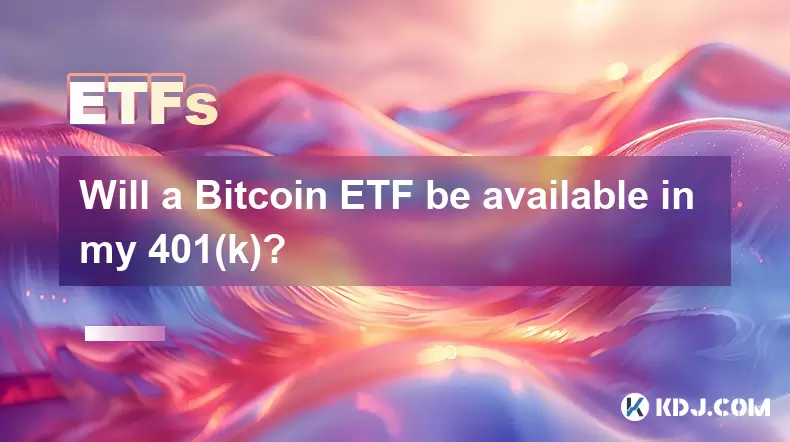
Will a Bitcoin ETF be available in my 401(k)?
Jul 17,2025 at 10:42pm
What is a Bitcoin ETF?A Bitcoin ETF (Exchange-Traded Fund) is an investment vehicle that tracks the price of Bitcoin without requiring investors to di...
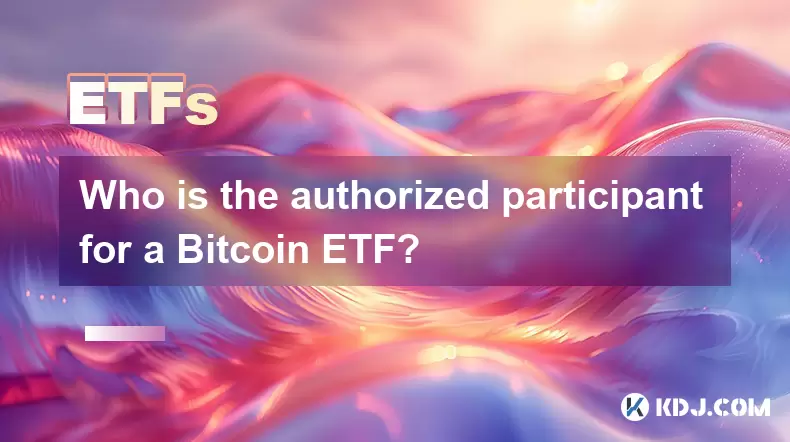
Who is the authorized participant for a Bitcoin ETF?
Jul 18,2025 at 12:42am
Understanding the Role of Authorized Participants in Bitcoin ETFsIn the context of Bitcoin Exchange-Traded Funds (ETFs), an authorized participant (AP...
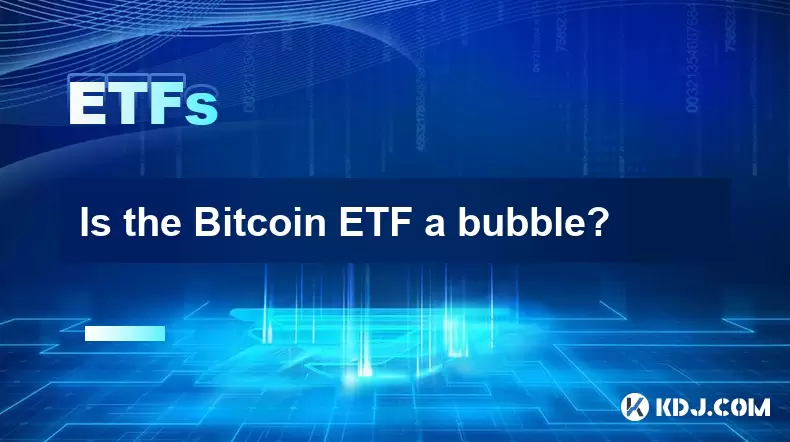
Is the Bitcoin ETF a bubble?
Jul 20,2025 at 06:57am
Understanding the Bitcoin ETF ConceptA Bitcoin Exchange-Traded Fund (ETF) is a financial product that aims to track the price of Bitcoin without requi...
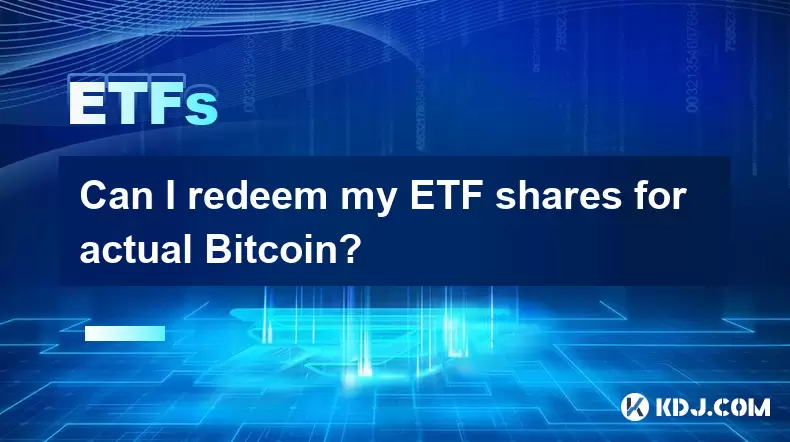
Can I redeem my ETF shares for actual Bitcoin?
Jul 17,2025 at 03:14pm
Understanding ETF Shares and Their Relation to BitcoinExchange-Traded Funds (ETFs) have become a popular investment vehicle for those looking to gain ...

What is the best platform to trade Bitcoin ETFs?
Jul 23,2025 at 04:14am
Understanding Bitcoin ETFs and Their Role in TradingBitcoin Exchange-Traded Funds (ETFs) have gained significant traction among traditional and crypto...

What is the best platform to trade Bitcoin ETFs?
Jul 17,2025 at 03:50pm
Understanding Bitcoin ETFs and Their Role in the MarketBitcoin Exchange-Traded Funds (ETFs) are investment vehicles that track the price of Bitcoin wi...

Will a Bitcoin ETF be available in my 401(k)?
Jul 17,2025 at 10:42pm
What is a Bitcoin ETF?A Bitcoin ETF (Exchange-Traded Fund) is an investment vehicle that tracks the price of Bitcoin without requiring investors to di...

Who is the authorized participant for a Bitcoin ETF?
Jul 18,2025 at 12:42am
Understanding the Role of Authorized Participants in Bitcoin ETFsIn the context of Bitcoin Exchange-Traded Funds (ETFs), an authorized participant (AP...

Is the Bitcoin ETF a bubble?
Jul 20,2025 at 06:57am
Understanding the Bitcoin ETF ConceptA Bitcoin Exchange-Traded Fund (ETF) is a financial product that aims to track the price of Bitcoin without requi...

Can I redeem my ETF shares for actual Bitcoin?
Jul 17,2025 at 03:14pm
Understanding ETF Shares and Their Relation to BitcoinExchange-Traded Funds (ETFs) have become a popular investment vehicle for those looking to gain ...
See all articles























